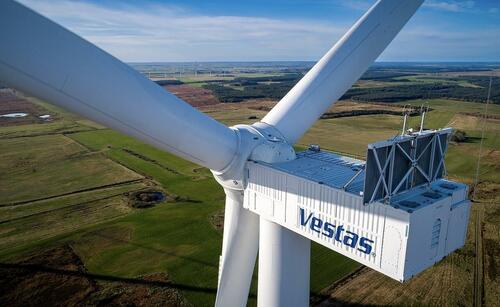Henrik Andersen, CEO of Vestas Wind Systems A/S, has urged European policymakers to adopt a more cohesive industrial strategy to maintain competitiveness in the renewable energy sector. Speaking to Bloomberg News, Andersen emphasized that without stronger policies, Europe risks losing its leadership in renewable energy manufacturing to the United States and other regions. “Wind is largely a European creation — born in our universities, tested on our sites,” he stated. “If we don’t protect and support what we’ve built, companies like ours will eventually move out of Europe. It’s that simple.”
Andersen’s warning comes as Europe grapples with various challenges, including weak economic growth and obstacles to meeting carbon reduction targets. These issues were highlighted in a recent report by former Italian Prime Minister Mario Draghi, which pointed out the need for enhanced strategies to ensure the region’s competitiveness. Additionally, geopolitical tensions, such as Iran’s threats to block the Strait of Hormuz and ongoing instability from the war in Ukraine, have further stressed the urgency of achieving energy independence in Europe.
“When you’re self-sufficient, energy prices fall,” Andersen noted. “So if Europe wants any of this, then energy and industrial policy need to be very closely linked.” He argued for an industrial policy that allows European companies to thrive both domestically and on a global scale. Despite its technical leadership in wind technology, Europe faces significant hurdles due to its fragmented regulatory landscape, high inflation, rising interest rates, and supply chain disruptions.
Competition from Chinese turbine manufacturers has intensified, particularly with recent deals struck in Germany. Some of these arrangements are now facing scrutiny due to national security concerns. Andersen criticized the EU’s historical reluctance to promote industrial consolidation, which he believes has left European companies at a disadvantage. “For decades, we’ve said no to mergers and consolidation in the name of competition,” he remarked. “Now it’s that very fragmentation that’s making Europe uncompetitive.”
He highlighted the U.S. as a model for European policy, referencing the American approach to energy independence and industrial scale. Even in the face of political threats to renewable subsidies, Andersen acknowledged that the U.S. has maintained a consistent long-term strategy. “I’m going to be a little bold and say it: Europe should look at what the U.S. has done,” he stated. “Over the past decades, America has built a level of energy independence that now allows them to export energy to Europe. That didn’t happen overnight. It took two or three decades of consistent policy, but it shows that it can be done.”
Vestas, headquartered in Aarhus, Denmark, has installed over 56,000 turbines in 71 countries since its founding in 1979. In recent years, the company has significantly expanded its operations in the United States, doubling its American workforce to over 5,000 in the past three years. Its factories in the U.S. are currently operating at full capacity to meet the growing demand.
“We’re not afraid to invest in the U.S.,” Andersen affirmed. “And we don’t expect any administration — current or future — to de-prioritize energy. In fact, we’re confident they’ll keep pushing forward.” As Europe navigates its energy future, the insights from Vestas’ CEO could play a crucial role in shaping a more unified and competitive energy policy across the region.






































































